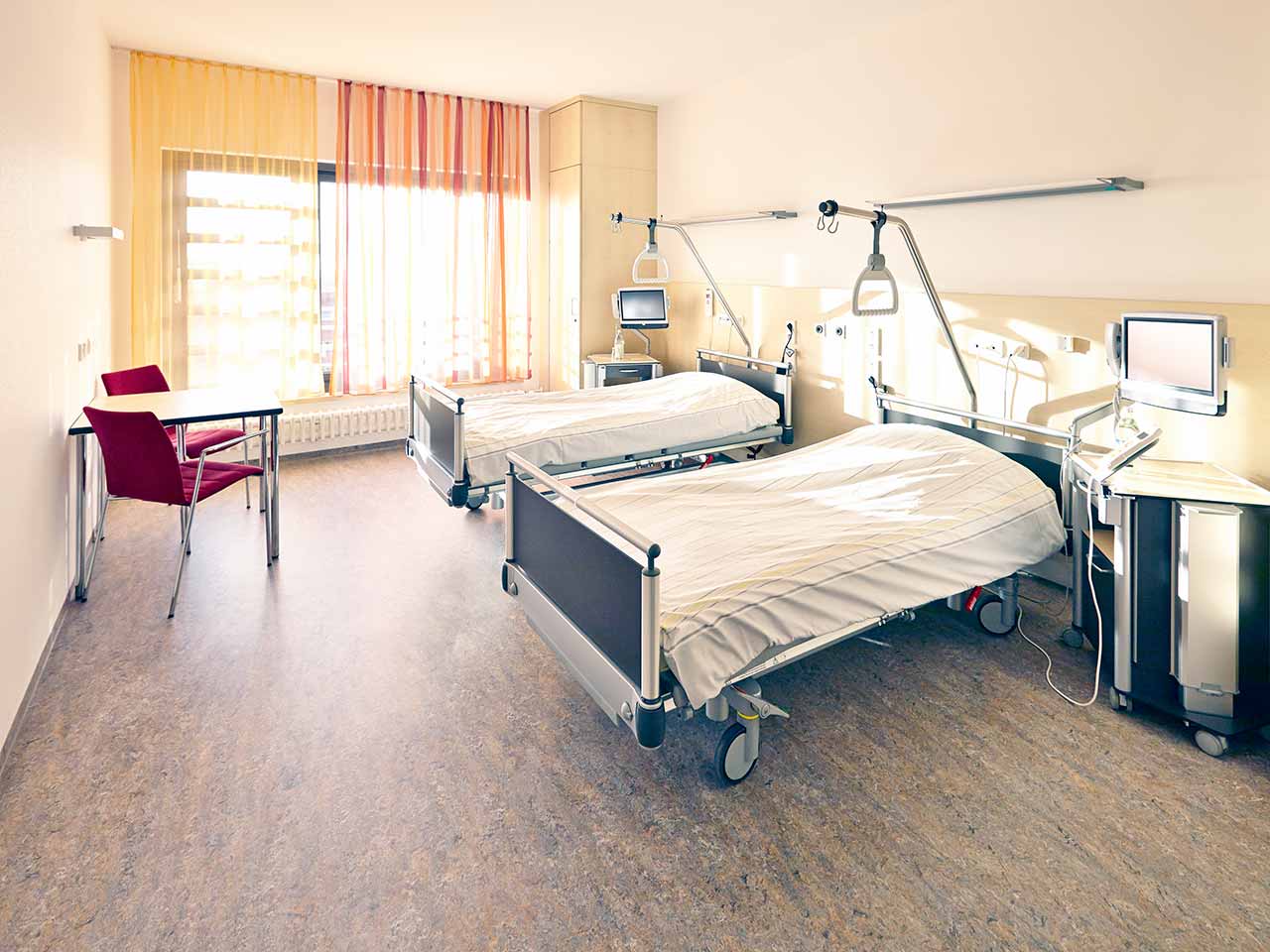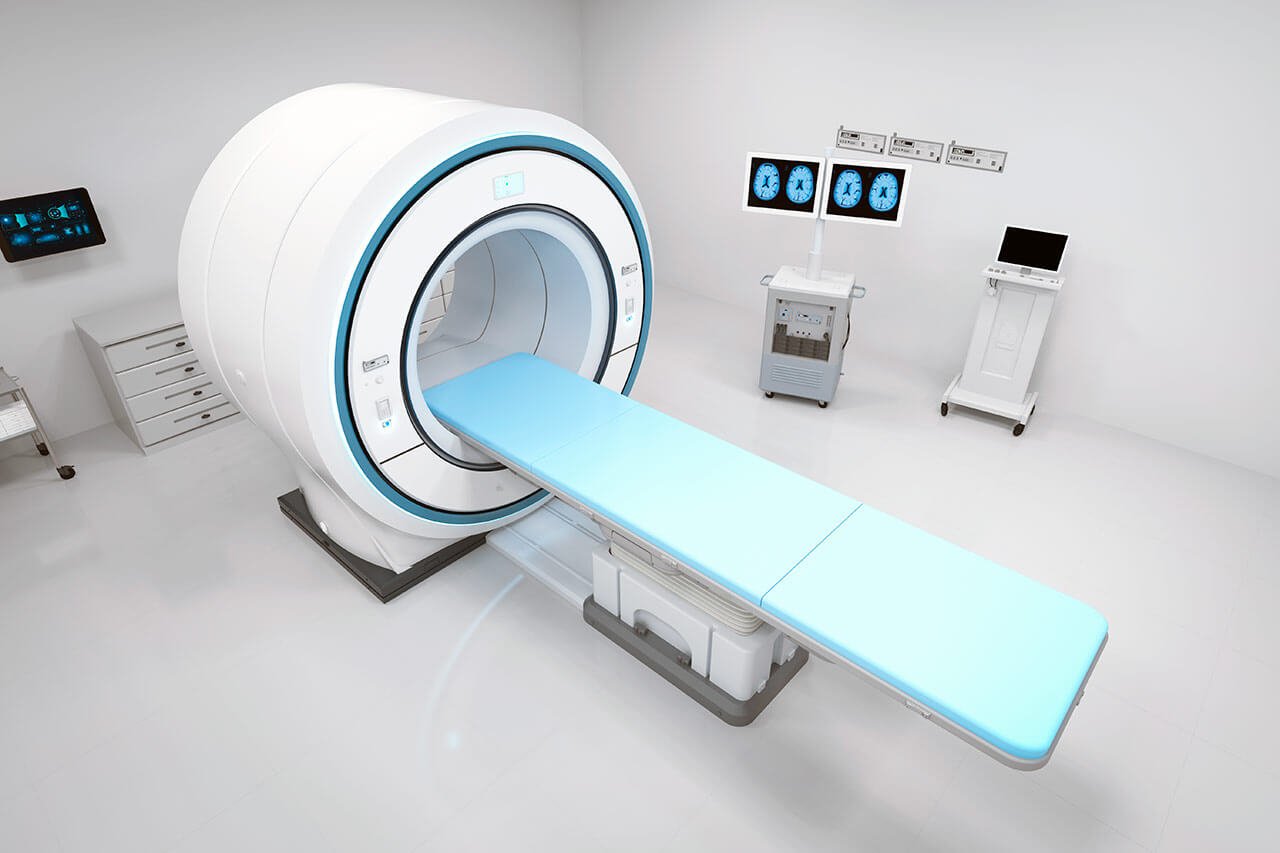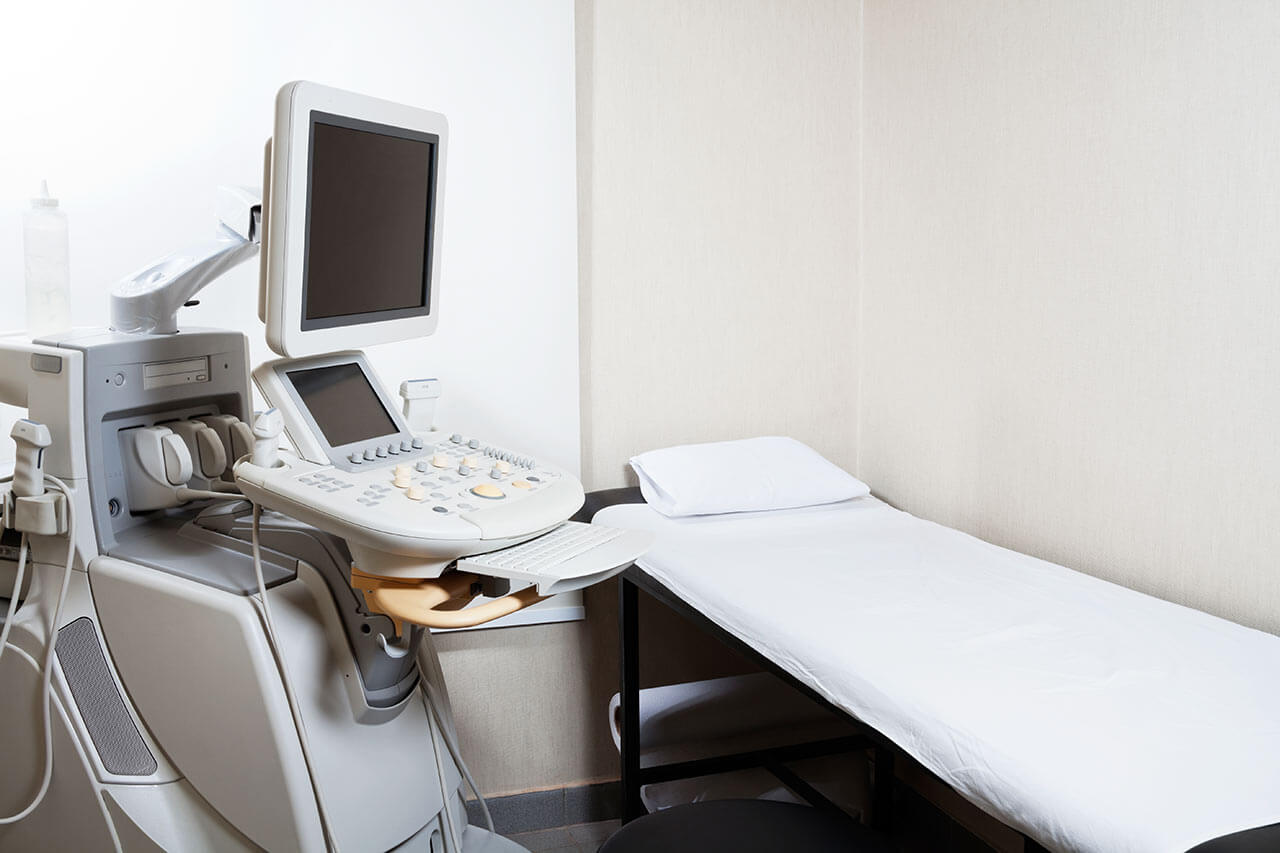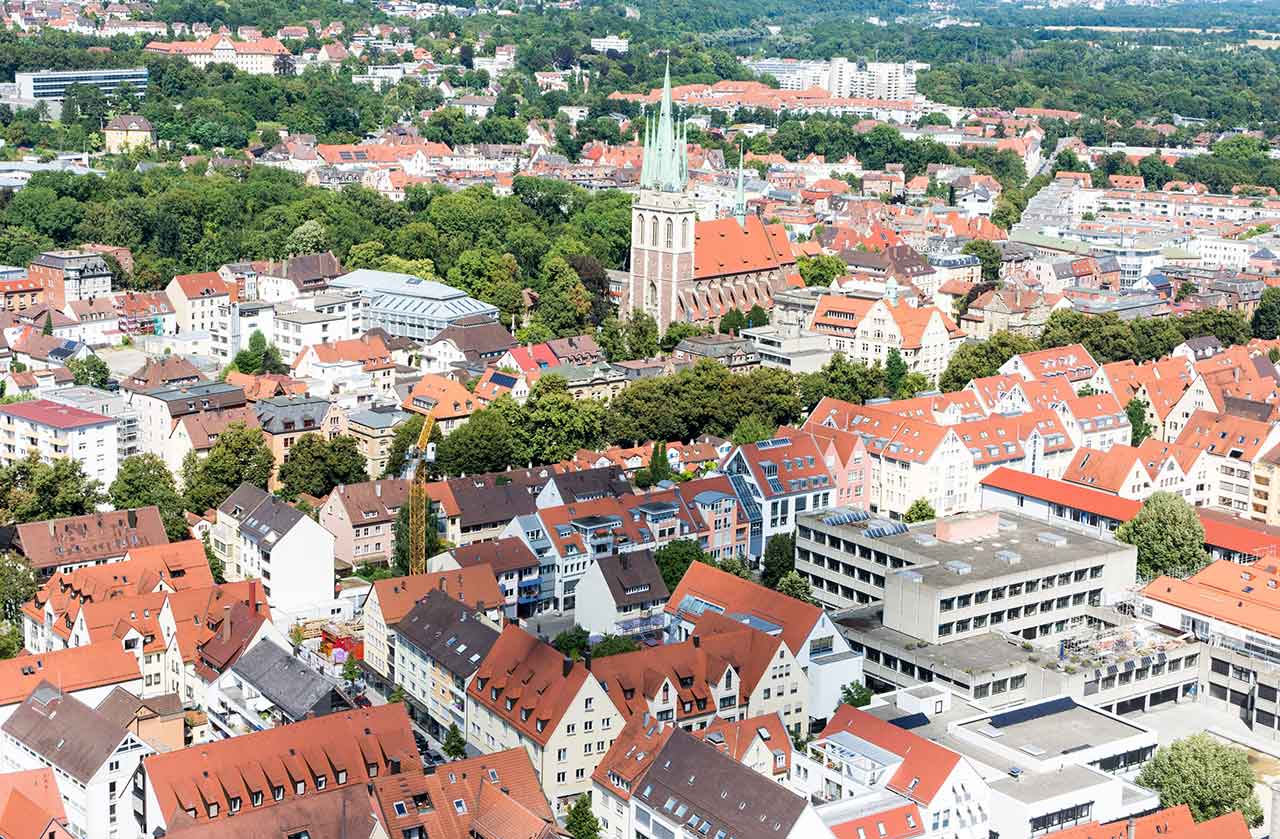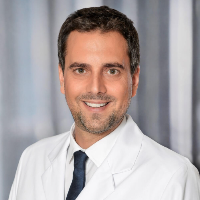
The program includes:
- Initial presentation in the clinic
- clinical history taking
- review of medical records
- physical examination
- urological examination
- laboratory tests:
- complete blood count
- general urine analysis
- biochemical analysis of blood
- inflammation indicators (CRP, ESR)
- indicators blood coagulation
- tumor marker, PSA
- ultrasound of the urogenital system
- CT/MRI of the abdomen and pelvis
- preoperative care
- transuretral tumor excision
- histologically and immunohistochemically
examination of the remote tissues - symptomatic treatment
- control examinations
- the cost of essential medicines and materials
- nursing services
- full hospital accommodation
- explanation of future recommendations
Required documents
- Medical records
- MRI/CT scan of the abdomen and pelvis (not older than 3 months)
- Biopsy results (if available)
Service
You may also book:
 BookingHealth Price from:
BookingHealth Price from:
About the department
The Department of Adult and Pediatric Urology at the University Hospital Ulm provides high-precision diagnostic examinations and effective treatment for diseases of the genitourinary system and reproductive system in men and boys. Of particular interest is drug therapy and surgical treatment of prostate, bladder, kidney, testicular, and penile cancers. The department is part of the Comprehensive Cancer Center Ulm (CCCU). For the patient, this means that their clinical case is studied by a multidisciplinary tumor board, which determines the optimal treatment tactics. The department is also certified by the German Cancer Society (DKG), so all therapeutic procedures meet strict national and international standards. The department's team of urologists also has unique clinical experience in the minimally invasive treatment of kidney stone disease, benign prostatic hyperplasia, neuro-urological dysfunction, and all urologic diseases in children. During the surgical treatment, the specialists at the medical facility successfully use minimally traumatic surgical techniques. They perform endoscopic, laser, minimally invasive, and robot-assisted surgery using the innovative Da Vinci system. The department treats about 3,000 inpatients and 9,000 outpatients with clinical cases of varying complexity annually. The number of surgical procedures performed and treatment outcomes are regularly published by the authorized commission of the Initiative Quality in Medicine (IQM).
The Head Physician of the department is Prof. Dr. med. Christian Bolenz. The doctor has over 18 years of clinical experience, during which he has saved thousands of patients with urologic pathologies of varying severity. For three years, the professor worked as the President of the Southwest German Society for Urology, and today he is a Member of this society as well as a Member of the German, European, and American Societies of Urology. Dr. med. Bolenz is actively involved in scientific publications (more than 220 to date). He also lectures and speaks at national and international conferences.
The department enjoys a reputation as one of the best Prostate Cancer Centers in Germany, which is confirmed by the prestigious certification from the German Cancer Society (DKG) in this field. Prostate cancer is the most common and life-threatening oncological condition among men. The department's specialists admit more than 500 patients with this diagnosis every year. As a rule, the first-line treatment for confirmed prostate cancer is surgical tumor resection or radical prostatectomy (the surgical removal of the prostate gland along with its capsule and seminal vesicles). The department's surgeons prefer operations using the Da Vinci surgical system, if possible. Such interventions are characterized by the highest precision and minimal trauma rate. And what is more, the risks of erectile dysfunction and urinary incontinence (the most severe and common complications of prostate cancer surgery) are practically equal to zero. The department's team of urologists has performed more than 600 interventions using the Da Vinci surgical system, which confirms their impressive experience in this field. Patients with prostate cancer are treated in cooperation with doctors from related medical specialties using effective systemic therapy methods such as hormone therapy, targeted therapy, chemotherapy, and immunotherapy. Nuclear medicine specialists, together with urologists, also offer innovative radionuclide Lutetium-177 PSMA therapy.
An integral part of the department's clinical practice is medical care for patients with kidney cancer. This cancer is more prevalent in men than in women. As of today, the department's urologists have highly informative imaging diagnostic methods (ultrasound, CT, and MRI), thanks to which kidney malignancies are detected in the early stages when the patient has a high chance of full recovery. The treatment is based on resection of the neoplasm or removal of the affected kidney. The department's specialists prefer organ-preserving surgery, so a large number of interventions performed in the department allow the doctors to save the affected organ. If clinically indicated, surgeons use minimally invasive and robot-assisted techniques (the Da Vinci surgical system), thanks to which patients recover extremely quickly after surgery. The department also uses radiofrequency ablation for the treatment of small tumors (the procedure is performed in cooperation with interventional radiologists). In advanced stages of kidney cancer, surgery is complemented by conservative methods, including molecularly targeted drugs, immune checkpoint inhibitors (immunotherapy), etc. Chemotherapy and radiation therapy for kidney cancer are rarely used due to their low effectiveness against this type of cancer.
Another important focus of the department's urologists is the treatment of benign prostatic hyperplasia. This pathology significantly increases the size of the organ. The pathological process is accompanied by many unpleasant symptoms, including urinary disorders, hematuria (the presence of blood in the urine), and recurrent urinary tract infections. The treatment regimen depends on the severity of the symptoms. It is determined based on the results of the IPSS questionnaire (International Prostate Symptom Score), clinical examination, and assessment of the degree of enlargement of the organ, palpation of the prostate, and transrectal ultrasound. The department's doctors brilliantly perform endoscopic treatment of prostate adenoma using bipolar and monopolar transurethral resection under video control, thulium laser enucleation, and holmium laser enucleation. The innovative Rezum procedure (water vapor ablation) is also available here. The optimal treatment is determined on an individual basis.
In the field of pediatric urology, the department offers effective treatment for congenital and acquired diseases, developmental disorders, and functional genitourinary disorders in newborns, young children, and adolescents. The specialists in pediatric nephrology and surgery may be engaged in the therapeutic process if required. The team of pediatric urologists conducts conservative and surgical treatment of hypospadias, phimosis, varicocele, hydrocele, cryptorchidism, vesicoureteral reflux, urinary incontinence, and other pathologies. If a child requires surgery, the doctors always aim to perform the intervention using endoscopic or minimally invasive techniques.
The department's range of medical services includes the following:
- Diagnostics and treatment of malignant urologic diseases
- Diagnostics and treatment of prostate cancer
- Diagnostics and treatment of kidney cancer
- Diagnostics and treatment of bladder cancer
- Diagnostics and treatment of urothelial carcinoma
- Diagnostics and treatment of testicular cancer
- Diagnostics and treatment of penile cancer
- Diagnostics and treatment of benign urologic diseases
- Diagnostics and treatment of benign prostatic hyperplasia
- Diagnostics and treatment of kidney stone disease
- Diagnostics and treatment of neuro-urological disorders
- Diagnostics and treatment of urologic diseases in children
- Diagnostics and treatment of cryptorchidism
- Diagnostics and treatment of hydrocele
- Diagnostics and treatment of varicocele
- Diagnostics and treatment of hypospadias
- Diagnostics and treatment of phimosis
- Diagnostics and treatment of vesicoureteral reflux
- Diagnostics and treatment of ureteropelvic junction obstruction
- Diagnostics and treatment of a megaureter
- Diagnostics and treatment of the exstrophy-epispadias complex
- Diagnostics and treatment of urethral valves
- Diagnostics and treatment of urinary incontinence
- Diagnostics and treatment of other urologic conditions in adults and children
The department's therapeutic options include the following:
- Conservative treatment
- Conservative treatment of malignant diseases
- Chemotherapy
- Radiation therapy
- Immunotherapy
- Targeted therapy
- Lutetium-177 PSMA therapy (in collaboration with the Department of Nuclear Medicine)
- Conservative treatment of benign diseases
- Drug therapy
- Extracorporeal shockwave therapy for kidney stone disease
- Conservative treatment of malignant diseases
- Surgical treatment
- Endoscopic surgery
- Minimally invasive surgery
- Da Vinci robot-assisted surgery
- Other treatment methods
Curriculum vitae
Higher Education and Professional Career
- 1997 - 2004 Medical studies in Heidelberg, Lyon, and Freiburg.
- 11.2004 Final Examination in Medicine and admission to medical practice.
- 2004 - 2010 Assistant Physician and Research Fellow, Department of Urology, University Hospital Mannheim.
- 2007 Thesis defense, Faculty of Medicine, University of Heidelberg. Subject: "Anatomical repair of congenital transposition of the main arteries: incidence of neopulmonary stenosis after augmentation plastic surgery for pulmonary artery reconstruction".
- 2008 Research Scholarship, Department of Urology, University of Texas Southwestern Medical Center, Dallas, Texas, USA.
- 2010 Board certification in Urology; Senior Physician, Department of Urology, University Hospital Mannheim.
- 04.2011 Venia Legendi in Urology, Faculty of Medicine in Mannheim, Heidelberg University.
- 2011 Habilitation, Faculty of Medicine, Ruprecht Karl University of Heidelberg. Subject: "Progression and metastasis of urothelial cancer: new molecular pathologic markers as well as experimental therapeutic approaches".
- 2012 - 2015 Head of the Section for Urologic Oncology, Department of Oncology, University Hospital Mannheim; Managing Senior Physician, Department of Urology, University Hospital Mannheim.
- 2013 Additional qualification in Tumor Drug Therapy.
- 2013 - 2015 Chairman of the Working Group on Oncology at the Interdisciplinary Cancer Centre of the University Hospital Mannheim.
- Since 2013 Head of the commission for the development of guidelines for bladder cancer treatment, as well as Deputy Head of the Working Group on Urinary Diversion Techniques.
- 2015 Extraordinary Professorship, Ruprecht Karl University of Heidelberg.
- 2015 Invitation to the position of W3 Professor for Urology at the Faculty of Medicine, University of Ulm.
- Since 01.09.2015 Head Physician, Department of Adult and Pediatric Urology, University Hospital Ulm.
Clinical Interests
- Treatment of tumors of the genitourinary system and male reproductive system.
- Pelvic surgery.
- Robot-assisted surgery.
- Organ-preserving surgery for kidney tumors.
- Diagnostics and treatment of bladder and prostate cancers.
Research Interests
- Innovative imaging methods for tumors of the genitourinary system and male reproductive system.
- Molecular urologic oncology.
- Precision medicine in bladder cancer.
Prizes, Awards, and Honors
- 2006 Poster Award from the German Society of Urology (DGU).
- 2007 Best Poster Award on Fundamental Research of Urothelial Cancer, European Association of Urology (EAU).
- 2008 Best Poster Award on Fundamental Research of Urothelial Cancer, European Association of Urology (EAU).
- 2009 Werner Staehler Memorial Prize, Southwest German Society for Urology (SWDGU).
- 2009 Report Award, German Society of Urology (DGU).
- 2010 First Prize, European Association of Urology (EAU).
- 2011 First Prize, Club of 35 Young Urologists, Southwest German Society for Urology (SWDGU).
- 2014 Report Award, German Society of Urology (DGU).
Memberships in Professional Societies and Organizations
- German Society of Urology (DGU).
- German Society for Robot-Assisted Urology (DEGRU).
- Southwest German Society for Urology (SWDGU).
- European Association of Urology (EAU).
- American Urological Association (AUA).
- Endourological Society.
- German Research Association for Bladder Carcinoma (DFBK).
- Committee on the Elaboration of S-3 Interdisciplinary Guidelines for Bladder Cancer Treatment.
- German Cancer Society (DKG).
- Association of Urological Oncology (AOU).
- Initiative Program for Bladder Cancer Research for the Development of New Drugs (BRÜCKEN Consortium).
- International Bladder Cancer Network (IBCN).
- Board Member of the Comprehensive Cancer Center Ulm (CCCU).
Photo of the doctor: (c) Universitätsklinikum Ulm
About hospital
The University Hospital Ulm is an advanced medical complex that provides patients with high-class medical care using the very latest scientific achievements. The medical facility has been performing successful clinical activities for more than 40 years and has long earned an excellent reputation throughout Europe. The hospital regularly demonstrates high treatment success rates, takes an active part in the training of medical students, and works tirelessly on promising research projects.
The university hospital consists of 29 specialized departments and 16 scientific institutes, where more than 7,000 highly qualified employees work for the benefit of their patients. More than 55,000 inpatients and about 300,000 outpatients are treated here every year. The hospital has 1,274 beds. The medical team of the hospital is focused on providing personalized medical services using the most modern and sparing diagnostic and treatment methods.
The University Hospital Ulm is the largest medical complex in the region, and practically all areas of modern medicine are represented here. Transplantology and oncology are among the priority areas of clinical activity in the medical facility. The hospital holds leading positions in the world in bone marrow transplantation. In addition, the hospital has advanced experience in cancer treatment. The Comprehensive Cancer Center is recognized as the leading facility of this kind in the country, and it is certified by the German Cancer Society (DKG). It provides effective treatment for various types of cancer. The center also offers innovative CAR T-cell therapy. In addition, the Cancer Center is actively engaged in research activities to improve available treatment methods and develop innovative therapeutic techniques to fight cancer.
Along with the use of advanced technologies, doctors show respect, understanding, and a humane attitude toward the patient. The medical team includes competent psychologists, who are always ready to provide assistance and support to the patients and their families during the therapeutic process.
Photo: (с) depositphotos
Accommodation in hospital
Patients rooms
The patients of the University Hospital Ulm live in comfortable single and double rooms with a modern design and light colors. All patient rooms have an ensuite bathroom with a toilet and a shower. The patient room furnishings include a comfortable automatically adjustable bed, a bedside table, a wardrobe, a table and chairs, a telephone, a radio, and a TV. Wi-Fi access is also available in patient rooms.
The hospital also offers enhanced-comfort rooms, which additionally have a safe, a refrigerator, and upholstered furniture. The bathroom in the enhanced-comfort room has changeable towels, a cosmetic mirror, a hairdryer, and toiletries.
Meals and Menus
Patients and their accompanying person are offered three meals a day: breakfast, lunch, and dinner. The patient and accompanying person have a choice of three menus every day, including a vegetarian menu. Patients staying in the enhanced-comfort rooms are also offered light snacks, fruits, desserts, and hot and cold drinks in the comfortable lounge area.
If, for some reason, you do not eat all the foods, you will be offered an individual menu. Please inform the medical staff about your dietary preferences prior to treatment.
Further details
Standard rooms include:
![]() Shower
Shower
![]() Toilet
Toilet
![]() Wi-Fi
Wi-Fi
![]() TV
TV
Religion
The hospital has a chapel where Catholic and Protestant services are held weekly. The services are also broadcast on the internal television channel of the hospital. The chapel is open 24 hours a day for visits and prayers.
The services of other religious representatives are available upon request.
Accompanying person
Your accompanying person may stay with you in your patient room or at the hotel of your choice during the inpatient program.
Hotel
You may stay at the hotel of your choice during the outpatient program. Our managers will support you for selecting the best option.
